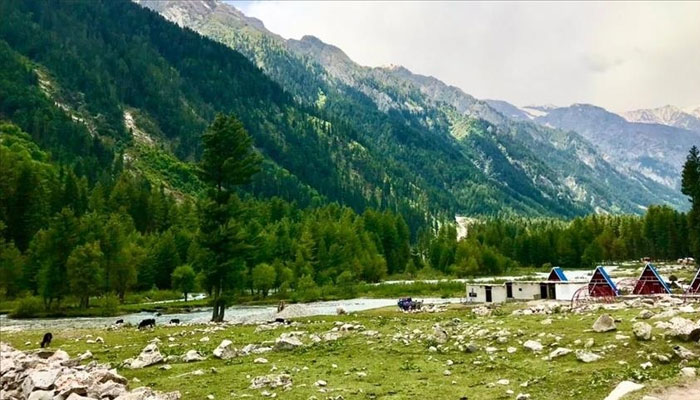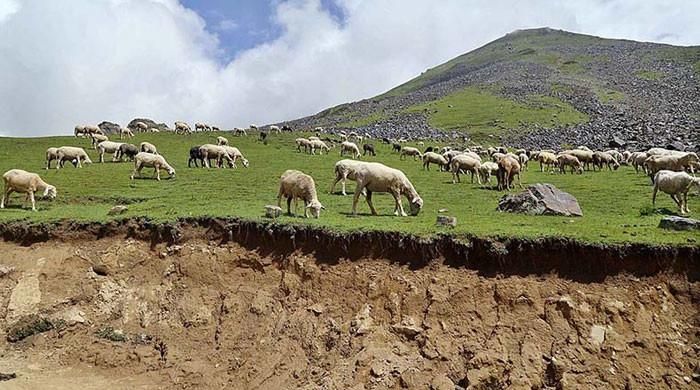Picturesque destinations that lose their appeal for tourists who usually flock to visit snow-covered mountains in winter.
Northern areas of Pakistan are yet to receive the first snowfall of this season, which is reducing the influx of tourists to popular destinations, including the picturesque valleys of Kalam and Malam Jabba.
The Kalam Valley, located about 326 kilometers from the capital Islamabad, depends on income from tourism at this time of winter, usually packed with tourists on its streets and hotels to absorb the striking view of the snow-capped mountains.
In addition, the lack of snowfall would also affect agriculture, fishing and hydroelectricity in the region, which now sports a brown and arid appearance.

The northwest region typically receives moderate to heavy snowfall between mid-December and late January.
After facing back-to-back weather calamities, the northern and northwestern parts of the country now face the new challenge of snowless winters that would begin to pinch the economic nerve of the Kalam and Malam Jabba valleys in picturesque Swat, often referred to as the “Switzerland.” from Pakistan.”
according to anadoluAccording to a local hotelier's report, the region witnessed a 60-70% decline in the number of tourists for one obvious reason: the snowless winter.
“Last year was a packed season. We had to get extra rooms to cope with the number of tourists. But today, 70% of our rooms are empty despite a concession in rates,” he added.
The situation is no different in neighboring Malam Jabba, home to the country's largest ski resort and center of winter sports festivals, where hotels sit empty as traders and transporters kill time with idle chatter.
“We are praying for snowfall. That would mean a lot to us. Snowfall is a lifeline for our economy,” Mohammad Adil, who runs a hotel in the main Malam Jabba bazaar, told the Ankara-based news agency.
The Gilgit Baltistan (GB) region, in the north of the country, located at the confluence of the world's largest mountain ranges (the Karakoram, the Himalayas, the Hindu Kush and the Pamirs) and home to five of the 14 highest peaks of 8,000 meters, received light snowfall. in November last year, but in the high season there is still no snow.
Iqbal Hussain, director of the GB Tourism Department, told the foreign media outlet: “Snow rules our entire economy, in terms of tourism, fishing, agriculture and hydroelectricity. No, or less snowfall means less water and, consequently, less fishing and less agriculture, as well as power outages.”
He explained that no snowfall or less snow would mean early spring water would be a big problem for local farmers and those associated with the fishing sector, as well as causing a further decline in groundwater levels.
The senior tourism department official said that although the region does not primarily attract snow-loving tourists, it has traditional winter activities that are likely to be affected by the lack of snow this year.
The situation has forced his department to move the venue of this year's “winter festival”, a traditional winter recreational festival, from the Hunza Valley to Ghizer district.
Pakistan is among the 10 countries most vulnerable to challenges related to climate change and global warming, although its share in the release of planet-warming gases is less than 1%.
Environmentalists believe that climate change has gradually made the region's weather patterns “erratic” and “extreme” in recent years, resulting in unpredictable rain, snowfall and long periods of drought.
“Although we cannot associate any particular phenomenon as a total result of climate change, it is true that weather patterns have become erratic and unpredictable due to this over the years,” said Sardar Sarfraz, director of the Pakistan Meteorological Department ( PMD). saying.
“Pakistan has so far received 92% and 80% less rainfall in December and January compared to this period last year,” Sarfraz said while detailing the impacts of climate change.
The lack of rain and snowfall is due to the fact that so far the “western wave” system that brings them to the region has not developed adequately, he explained.
However, he said the northern and northwestern regions of Pakistan were likely to receive “good rains” later this month, although they would still be less compared to last January.












